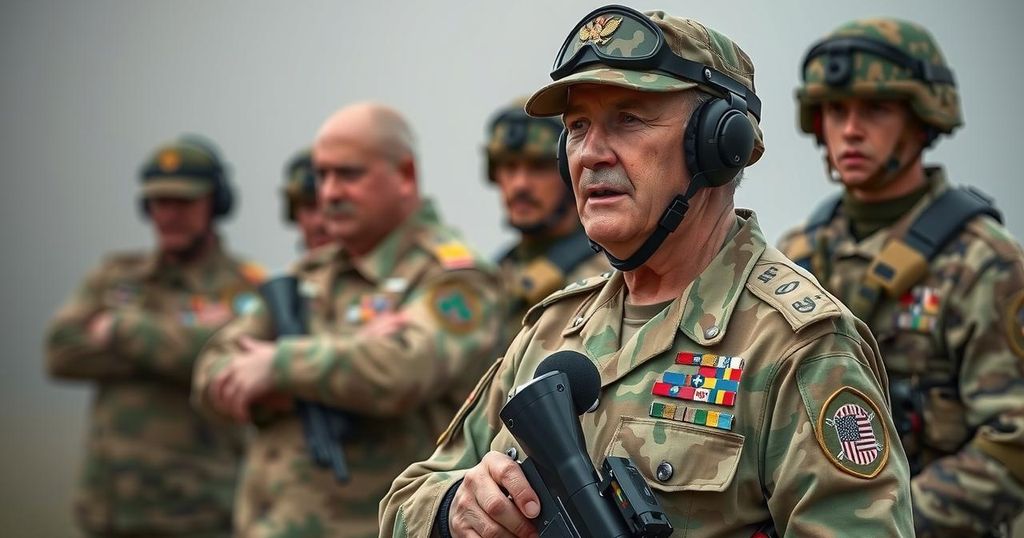Brigadier General Behrouz Esbati of Iran has publicly stated that Iran faced significant defeats in Syria, marking a departure from previous narratives of strength. He criticized Assad’s rejection of military proposals and Russian actions that hindered Iranian efforts. Esbati highlighted internal issues within Syria as contributing factors to the regime’s instability and affirmed Iran’s commitment to maintaining its influence despite these setbacks.
In a candid admission, Brigadier General Behrouz Esbati of Iran has acknowledged the severe setbacks faced by Iranian forces in Syria, commenting that Iran was “defeated very badly.” This statement signifies a shift from Tehran’s usual narrative of success. During a speech at a Tehran mosque, Esbati expressed regret over the loss of strategic influence in Syria, particularly highlighting the failure of Iranian proposals to use Syrian territory for operations against Israel and the detrimental role of Russian forces in these efforts.
Esbati criticized the strained relations between Iran and Syrian President Bashar Assad, who reportedly rejected Iranian proposals for military cooperation against Israel, contributing to the regime’s eventual downfall. He stated that his team had prepared detailed military strategies to counter Israel but faced opposition from Assad, which he believes played a significant role in the collapse of the regime. Furthermore, he recounted his departure from Damascus just before it fell to rebel forces, underscoring the extent of Iran’s losses.
The general also voiced concerns over Russian actions, suggesting that their bombing campaigns were misdirected, targeting empty fields rather than aggressive rebel positions. He claimed that the deactivation of radar systems during Israeli operations against Iranian targets further exemplified Russian negligence, leading to Iranian vulnerabilities. Despite these hurdles, Esbati asserted Iran’s continued influence in the region, outlining aspirations to bolster resistance under new Syrian leadership.
Moreover, Esbati pointed to systemic issues within Syria as factors contributing to the Assad regime’s collapse, including widespread corruption, economic challenges, and inadequate public services. He mentioned that Iran had continually urged Assad to enact reforms, which were repeatedly ignored. On the subject of responding to the assassination of Hezbollah leader Hassan Nasrallah, Esbati indicated that while Iran had conducted missile strikes against Israel, further retaliation was unlikely under current circumstances due to logistical limitations and the risk of provoking a strong response from the United States.
Despite admitting to difficulties, Esbati remained optimistic about Iranian prospects in Syria, stressing that the chaos might ultimately grant Iran better leverage in the region. He asserted that preparedness and existing networks could support future operations, reiterating Iran’s intent to remain active in the conflict and to form resistance cells if the situation allows.
The article discusses the public acknowledgment by Brigadier General Behrouz Esbati regarding the failures of Iran’s military involvement in Syria. With recent military setbacks and loss of territory, this admission marks a significant shift from Iran’s previously optimistic portrayals of its strategic standing in the ongoing conflict. The relationship between Iran and the Assad regime, as well as the role of Russia, are highlighted as critical factors in the struggles faced by Iranian forces, as well as the broader implications for Iran’s regional influence.
In conclusion, Brigadier General Behrouz Esbati’s remarks reveal the depth of Iran’s military setbacks in Syria, emphasizing the failures in strategic cooperation with the Assad regime and criticisms of Russia’s support. While he acknowledges the challenges and shifting dynamics in the region, Esbati retains a belief in Iran’s capacity to influence future developments, despite operational limitations and past losses. The situation in Syria continues to evolve, impacting the geopolitical landscape.
Original Source: www.ynetnews.com






